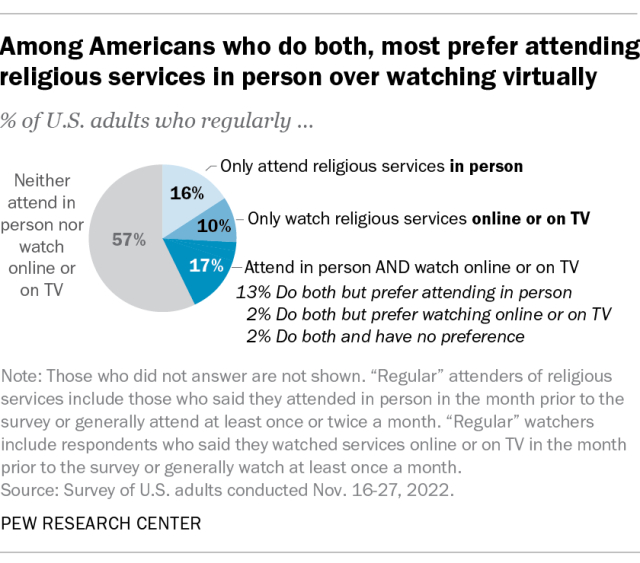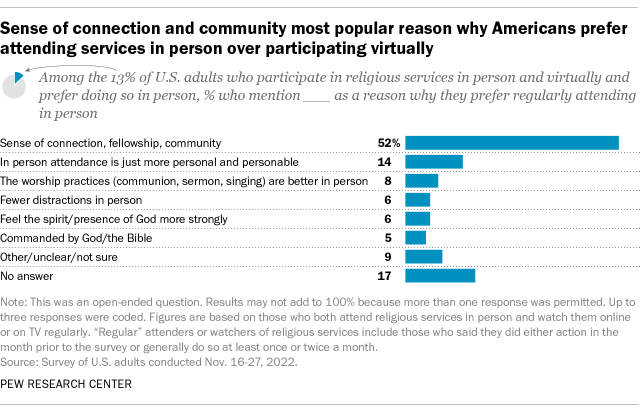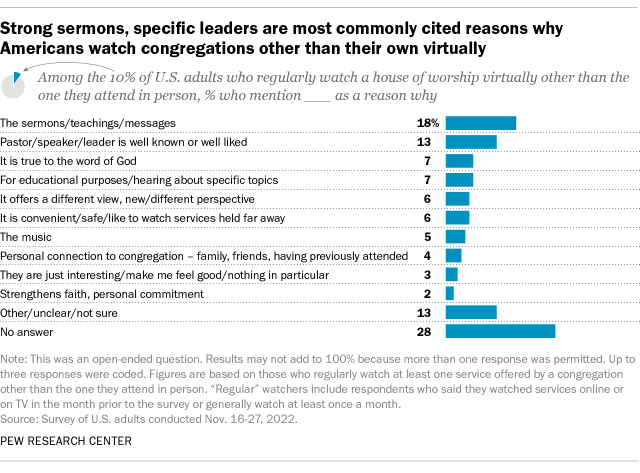Some 17% of U.S. adults regularly attend religious services in person and watch them online or on TV, according to a recent Pew Research Center survey. Roughly three-quarters of this group – making up 13% of all U.S. adults – say they prefer attending in person, while 2% prefer viewing services virtually and 2% have no preference.

The survey asked these respondents open-ended questions about why they prefer one kind of service over another. The responses show that Americans who prefer in-person services value the sense of connection, fellowship and community those services provide. People who prefer virtual services often cite convenience and health concerns.
This analysis comes from a Pew Research Center survey that explores how Americans use technology in their religious lives. We surveyed 11,377 U.S. adults from Nov. 16 to 27, 2022. Everyone who took part is a member of the Center’s American Trends Panel (ATP), an online survey panel that is recruited through national, random sampling of residential addresses. Address-based sampling ensures that nearly all U.S. adults have a chance of selection. The survey is weighted to be representative of the U.S. population by gender, race, ethnicity, partisan affiliation, education, religious affiliation and other categories. Read more about the ATP’s methodology.
Respondents were first asked whether they attend religious services in person and whether they watch services virtually. Those who said they do both regularly were asked which they prefer and asked to explain why in an open-ended question. Additionally, those who watch services offered by a congregation other than the one they attend in person were asked what draws them to these services.
“Regular” attenders of religious services include those who said they attended in person in the month prior to the survey or generally attend at least once or twice a month. “Regular” watchers include respondents who said they watched services online or on TV in the month prior to the survey or generally watch at least once a month.
Here are the questions used in this analysis, along with responses, and the survey methodology.
Why some Americans prefer in-person religious services
Among those who prefer in-person religious services, the most common reason respondents give is a stronger sense of connection and community with fellow participants. About half (52%) say this – more than three times the share who name any other reason.
One respondent puts it this way: “Watching online is a great option when you are unable to attend – but joining together with other believers is how we truly fellowship. You cannot get that from watching from afar.” Another says, “There is something powerful about being in community with other believers and getting that personal connection and fellowship. In person is much more uplifting and impactful.”
An additional 14% of those who prefer in-person services say that those services are more personal. As one respondent puts it: “It’s more up close and personal. You can answer questions. You can participate in the service to get a better understanding.” Another says, “In-person interaction gives me an opportunity to ask questions with the visiting scholar, [and] meet community members, and kids have better interaction with their peers.”

Another 8% of these respondents cite the quality of the worship practices at in-person services, saying that things like communion and singing can’t be replicated online:
- “As a Catholic, you cannot receive communion at home.”
- “For over 60 years I have been a church musician (organist/pianist) so congregational singing is very meaningful to me. Also, I think it is important to see, talk to and encourage my fellow believers.”
- “I enjoy taking part in the service; i.e., singing hymns, taking communion and seeing other church members in person.”
Smaller shares say they prefer in-person services because there are fewer distractions (6%), because they are better able to feel the spirit or presence of God (6%) or because attending in-person is a divine or scriptural commandment (4%).
Why some Americans prefer virtual religious services
There are too few respondents who prefer virtual religious services to provide precise data on their reasons for doing so. However, several respondents allude to the comfort and convenience of watching services online or on TV. One explains, “It gives me more freedom and extra time to multitask and do some other things.”
Others also mention the safety provided by virtual services. For example, “I don’t have to get dressed to go to the church. I can watch and listen more than once, and I don’t have to worry about being infected with others’ germs.”
What draws people to online religious services from congregations other than their own?
Fully 10% of U.S. adults say they attend religious services both in person and watch them virtually and say they watch virtual services offered by a different congregation than the one they attend in person most often.
The most common reason people in this group cite for watching virtual services from a different congregation is a preference for specific sermons, messages or teachings. One respondent points to “the message. The pastors I follow teach God’s truth. They don’t doctor, nuance or sugarcoat the parts you don’t like.” Says another, “The sermon is so uplifting when you’re feeling down. It gives you a sense of peace.” Another says, “The services are beautiful and the reflections during the homily are timely and inspire personal examination.”

Others mention the characteristics of specific pastors, speakers or other leaders:
- “The priest at that church is captivating and I prefer him even though it’s not our church.”
- “The pastor’s charisma and how he speaks.”
- “I watch [pastor’s name] daily. He preaches the Bible and relates it well with current events. He is able to explain the Bible so even those who do not study the Bible are able to understand. He is sincere about bringing unsaved [people] to Jesus.”
- “I watch [pastor’s name] because he is so positive and a wonderful person to watch.”
Other reasons these respondents mention include that the services they watch preach the “true word of God” and adhere closely to scripture, that the services are educational and that it is enjoyable to listen to a new or different perspective.
Note: Here are the questions used in this analysis, along with responses, and the survey methodology.

